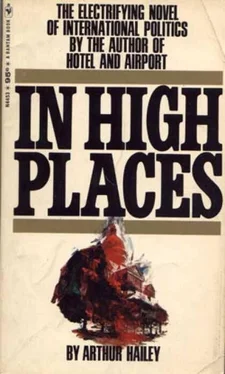Arthur Hailey - In High Places
Здесь есть возможность читать онлайн «Arthur Hailey - In High Places» весь текст электронной книги совершенно бесплатно (целиком полную версию без сокращений). В некоторых случаях можно слушать аудио, скачать через торрент в формате fb2 и присутствует краткое содержание. Жанр: Триллер, на английском языке. Описание произведения, (предисловие) а так же отзывы посетителей доступны на портале библиотеки ЛибКат.
- Название:In High Places
- Автор:
- Жанр:
- Год:неизвестен
- ISBN:нет данных
- Рейтинг книги:5 / 5. Голосов: 1
-
Избранное:Добавить в избранное
- Отзывы:
-
Ваша оценка:
- 100
- 1
- 2
- 3
- 4
- 5
In High Places: краткое содержание, описание и аннотация
Предлагаем к чтению аннотацию, описание, краткое содержание или предисловие (зависит от того, что написал сам автор книги «In High Places»). Если вы не нашли необходимую информацию о книге — напишите в комментариях, мы постараемся отыскать её.
In High Places — читать онлайн бесплатно полную книгу (весь текст) целиком
Ниже представлен текст книги, разбитый по страницам. Система сохранения места последней прочитанной страницы, позволяет с удобством читать онлайн бесплатно книгу «In High Places», без необходимости каждый раз заново искать на чём Вы остановились. Поставьте закладку, и сможете в любой момент перейти на страницу, на которой закончили чтение.
Интервал:
Закладка:
As Alan paused, sipping from a glass of ice water which Tom Lewis poured, there was a hint of a smile on the judge's face. At the other counsel's table, A. R. Butler, his distinguished features impassive, made a pencilled note.
Alan continued: 'I submit, my lord, that the deportation order affecting Henri Duval is defective because it cannot be carried out precisely.'
Now – the strongest pillar of his case – he sketched in the history of Rex vs Ahmed Singh, reading in detail from the volume of law reports he had brought to court, the significant portion flagged. In the 1921 case, stripped of legal verbiage, a Canadian judge had ruled: a rejected immigrant, Ahmed Singh, could not be deported solely to a ship. Nor, Alan insisted, could Henri Duval.
'Under the law,' Alan declared, 'the two situations are identical. Thus, under habeas corpus proceedings, the order should be quashed and my client freed.'
A. R. Butler stirred and made another note; soon he would have the opportunity of rebuttal and initiating argument himself. Meanwhile, Alan's words and reasoning flowed confidently on. He had told Senator Deveraux: I intend to win…
In the seat beside A. R. Butler, Edgar Kramer listened unhappily to the lengthening proceedings.
Edgar Kramer had a working knowledge of the law, and knowledge plus instinct told him that, for the Immigration Department, the hearing was not proceeding well. He also had a secondary instinct: that, if the verdict was adverse, a scapegoat might be found within the department. And there was an obvious one: himself.
He had been aware of this ever since the curt and cutting message two days earlier: 'The Prime Minister… extremely dissatisfied… handling of the case in judge's chambers… should not have offered a special inquiry… expect better performance in future.' The executive assistant who had relayed the censure by telephone had seemed to do so with especial relish.
Edgar Kramer seethed anew at the bitter, gross injustice. He had even been denied the elementary privilege of self-defence; of explaining to the Prime Minister personally that the special inquiry had been forced upon him by this judge, and that, faced with two impossible situations, he had chosen the least harmful and most expeditious.
It had been the correct thing to do, as everything he had done had been correct from the moment he had reached Vancouver.
In Ottawa, his instructions before departure had been explicit. The deputy minister had told him personally: if the stowaway Duval did not qualify for admittance as an immigrant under the law, then, under no circumstances would he be admitted. Furthermore, Edgar Kramer was authorized to take all necessary legal steps to prevent such admittance, whatever they might be.
There had been another assurance; political pressure or a public outcry would not be allowed to interfere with application of the law. The assurance, he was told, had come directly from the Minister, Mr Warrender.
Edgar Kramer had followed instructions conscientiously, as he had always done in the course of his career. Despite what was happening here and now, he had observed the law – the Immigration Act, as passed by Parliament. He had been dutiful and loyal, and not neglectful. And it was not his fault that an upstart lawyer and a misguided judge had thrown-his efforts out of joint.
His superiors, he supposed, would understand. And yet… the Prime Minister's displeasure was something else again.
Censure from a Prime Minister could cut a civil servant down; make him a marked man, with promotion barred. And even when governments changed, such judgements had a way of hanging over.
In his own case, of course, the censure had not been major; and perhaps already the Prime Minister had erased it from his mind. AH the same, uneasily, Edgar Kramer had an instinct that the brightness of his future, compared with a week ago, was slightly dimmed.
What he must guard against was another controversial step. If the Prime Minister were reminded of his name once more…
Within the courtroom the words flowed on. The judge had intervened with questions at several points, and now A. R. Butler and Alan Maitland were politely disputing a minute point of law. '… My learned friend says the order is in the exact terms of Section 36. I submit that the addition of these commas may be important. It is not in the exact terms of Section 36…'
Edgar Kramer hated Alan Maitland's guts. He also had an urge to urinate: emotion, including anger, nowadays had this effect. And there was no denying that lately his affliction had been worse, the pain from delay greater. He tried to shield his mind… to forget… to think of something else…
He turned his eyes to Henri Duval; the stowaway was grinning, not understanding, his gaze roving the courtroom. Every instinct Kramer possessed… his years of experience… told him that this man would never make a settled immigrant. His background was against him. Despite any help he might be given, such a man could not adapt and conform to a country he would never understand. There was a pattern of behaviour for his type: short-lived industry, then idleness; the eager search for quick rewards; weakness, dissolution; trouble… the pattern always moving downward. There were many cases in department files: the harsh reality which starry-eyed idealists ignored.
'… Surely, my lord, the sole issue on the return of a habeas corpus is the question of the validity of the custody…'
The thought… the urge to urinate, near physical pain… would no longer be subdued.
Edgar Kramer squirmed miserably in his chair. But he would not leave.
Anything, anything, rather than draw attention to himself.
Closing his eyes, he prayed for a recess.
It was to be no pushover, Alan Maitland realized. A. R. Butler, QC, was fighting hard, contesting every argument, citing precedents in rebuttal against Rex vs Ahmed Singh. The Judge, too, seemed extremely querulous, questioning minutely 'as if for some reason of his own, he wished Alan's presentation turned inside out.
At this moment A. R. Butler was defending the Immigration Department's actions. 'No individual freedom has been abrogated,' he declared. 'Duval, in the case at bar, has had his rights and now they have run out.'
The older lawyer's performance, Alan thought, was as impressive as ever. The deep, urbane voice continued, 'I submit, my lord, that to admit such an individual, under such circumstances as described, would inevitably open the gates of Canada to a flood of immigrants. These would not be immigrants as we know them. They would be those demanding admittance merely because they cannot remember where they were born, possess no travel documents, or speak in monosyllables.'
Instantly Alan was on his feet. 'My lord, I object to counsel's remarks. The question of how any man speaks…'
Mr Justice Willis waved him down. 'Mr Butler,' the judge said mildly, 'I don't suppose you or I can remember being born.'
The point I was making, my lord-'
'Furthermore,' the judge said firmly, 'I imagine that some of our most respected local families are descended from those who got off a boat without travel documents. I can think of several'
'If Your Lordship will permit-'
'And as for speaking in monosyllables, I find myself doing it in my own country – as, for instance, when I visit the province of Quebec.' The judge nodded equably. 'Please proceed, Mr Butler.'
For an instant the lawyer's face flushed. Then he continued, 'The point I was making, my lord – no doubt badly, as Your Lordship was generous enough to point out – is that the people of Canada arc entitled to protection under the Immigration Act…'
Outwardly, the words were summoned and marshalled with the same easy assurance. But now, Alan realized, it was A. R. Butler who was clutching straws.
Читать дальшеИнтервал:
Закладка:
Похожие книги на «In High Places»
Представляем Вашему вниманию похожие книги на «In High Places» списком для выбора. Мы отобрали схожую по названию и смыслу литературу в надежде предоставить читателям больше вариантов отыскать новые, интересные, ещё непрочитанные произведения.
Обсуждение, отзывы о книге «In High Places» и просто собственные мнения читателей. Оставьте ваши комментарии, напишите, что Вы думаете о произведении, его смысле или главных героях. Укажите что конкретно понравилось, а что нет, и почему Вы так считаете.












